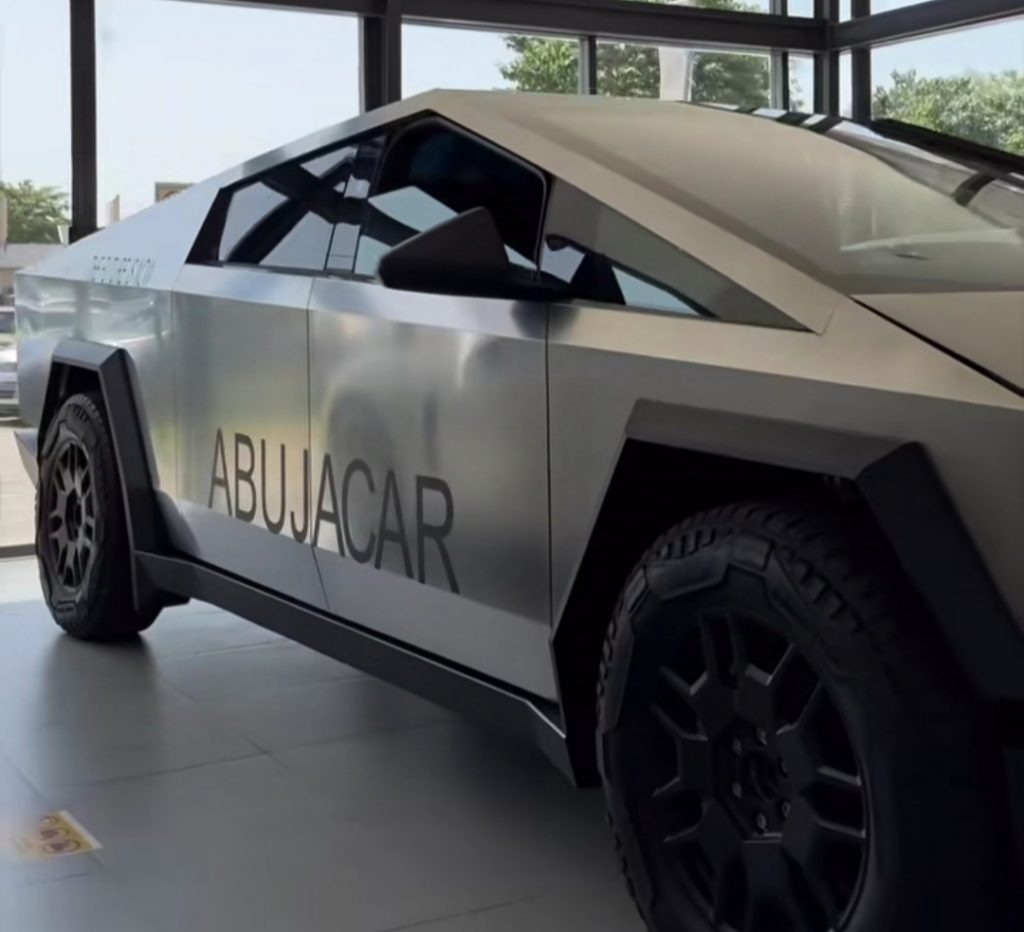Abuja, Nigeria’s capital city, has just witnessed a significant moment in the world of automobiles. The first-ever Tesla Cybertruck has officially arrived in the city, making waves not only because of its futuristic design but also due to its potential to transform Nigeria’s automotive landscape. Known for its sharp edges and unconventional look, the Cybertruck is turning heads worldwide, and now it’s doing the same in Nigeria’s heart. Pre-order now with Abuja Cars Online The First Cybertruck in Abuja
The Tesla Cybertruck: A Global Phenomenon

The Tesla Cybertruck has generated excitement since its unveiling in 2019. With its ultra-durable exoskeleton, angular body, and electric powertrain, it’s unlike any other vehicle on the market today. This all-electric truck is designed for strength, performance, and innovation, and its arrival in Abuja signals a potential shift towards electric vehicles (EVs) in Nigeria—an emerging market for eco-friendly technologies.
Tesla’s entry into the Nigerian market is a milestone, reflecting a broader global trend toward electric mobility. While Nigeria has yet to see widespread adoption of electric cars, this game-changing vehicle may accelerate the transition and serve as a catalyst for the future of green transportation in the country.
Why Abuja?
Abuja, known for its modern infrastructure and status as the political and administrative center of Nigeria, is an ideal location for such a high-tech debut. The city has long been seen as a hub for progress, development, and innovation, making it a natural choice for the introduction of a pioneering vehicle like the Cybertruck.
With a growing middle class and a rapidly expanding interest in technology, Abuja is well-placed to embrace electric vehicles. This first Cybertruck serves as a symbol of change, potentially sparking interest and conversations about the future of mobility in Nigeria.
What Sets the Tesla Cybertruck Apart?
The Tesla Cybertruck is not just a truck; it’s a technological marvel. Here’s why it’s so special:
- Rugged Design: Built with high-strength stainless steel, the Cybertruck is virtually indestructible. Its tough exterior is resistant to dents, scratches, and corrosion, making it ideal for Nigeria’s often challenging road conditions.
- Electric Power: The Cybertruck is fully electric, which means zero emissions and lower running costs. Given Nigeria’s fluctuating fuel prices, the Cybertruck offers a cost-effective alternative to petrol and diesel-powered vehicles.
- Autopilot Capabilities: Like other Tesla models, the Cybertruck comes equipped with Tesla’s advanced autopilot features, offering semi-autonomous driving. This feature could revolutionize commuting in Nigerian cities, reducing traffic-related stress and increasing road safety.
- Performance: The Cybertruck boasts impressive speed and power, with a 0 to 60 mph time of under 3 seconds for the top-tier model. It’s also engineered to handle rough terrains, which is perfect for both urban driving and off-road adventures.
Implications for Nigeria’s Automotive Landscape
The arrival of the first Cybertruck in Abuja could be a game-changer for Nigeria’s automotive market. Although electric vehicles are still relatively rare in the country, this landmark event could inspire more Nigerians to consider EVs for their next vehicle purchase.
As the Nigerian government continues to explore sustainable energy options, the presence of electric vehicles like the Cybertruck could help shift public perception and spark greater interest in renewable energy solutions. Abuja, with its focus on modernization, could be the starting point for a nationwide adoption of electric cars.
Moreover, this move by Tesla might encourage other automakers to follow suit and bring their electric models to Nigeria, further diversifying the market. Additionally, the Nigerian government may need to focus on expanding the necessary infrastructure—such as charging stations and service centers—to accommodate electric vehicles.
Challenges and Opportunities for EV Adoption in Nigeria
Despite the excitement surrounding the Cybertruck, there are still significant challenges to the widespread adoption of electric vehicles in Nigeria:
- Charging Infrastructure: The availability of EV charging stations is a major hurdle. However, the introduction of the Cybertruck could prompt investments in charging infrastructure, not just in Abuja but across major Nigerian cities.
- High Initial Cost: The upfront cost of electric vehicles remains a barrier in Nigeria, where affordability is a concern for many consumers. However, as demand grows and production scales, EV prices are likely to come down, making them more accessible to a broader range of Nigerians.
- Electric Grid Stability: Nigeria’s inconsistent power supply may pose a challenge for electric car owners, as frequent power outages could affect home charging. Nonetheless, this could open the door to innovative solutions like solar-powered charging systems.
Conclusion
The arrival of the first Tesla Cybertruck in Abuja marks an exciting moment in Nigeria’s automotive journey. It signifies the country’s potential to embrace cutting-edge technology and sustainable solutions for a more eco-friendly future. While there are challenges to overcome, the Cybertruck’s presence in Abuja may act as a catalyst for the wider adoption of electric vehicles in Nigeria, setting the stage for a new chapter in the country’s transportation sector.
As more Nigerians begin to see the benefits of EVs—both in terms of environmental impact and long-term savings—the landscape of the nation’s automotive market will continue to evolve. With the Cybertruck leading the charge, the future of electric vehicles in Nigeria looks promising.
Pre-order now with Abuja Cars Online
The First Cybertruck in Abuja
Also view this LUXURY Lamborghini Urus Giallo Auge

